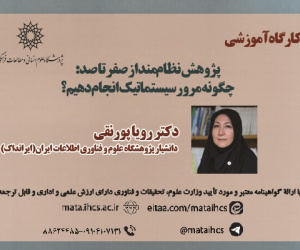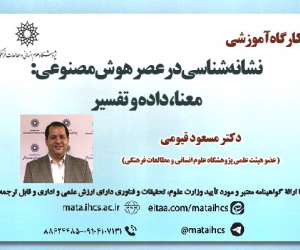مبانی حکمی آموزش هنرهای تجسمی از دیدگاه سنت گرایان
آرشیو
چکیده
نسبت آموزش، هنر و سنت در نزد سنت گرایان، بسیار مورد توجه است. از طرفی هم آموزش هنر به عنوان یک منبع درسی موثر در ساحت هنری و اخلاقیِ نظام تعلیم و تربیت از اهمیت بالایی برخوردار است. هدف پژوهش حاضر تبیین مبانی حکمی آموزش هنرهای تجسمی از نظر سنت-گرایان است. روش پژوهش، تحلیلی- استدلالی است. بدین صورت که ابتدا مبانی حکمی هنر و سنت تبیین شده و سپس به استنتاج اهداف آموزش هنرهای تجسمی پرداخته می شود. یافته ها بیانگر آن است که مبانی حکمی سنت گرایان دارای مشخصه هایی در ترسیم اهداف آموزش هنرهای تجسمی است. از جمله، اهدافی که به دست آمد عبارت از سودمندی، کاربردی بودن، معنویت، رازوارگی و ترویج اخلاق شایسته است. نتایج پژوهش بیانگر آن است که آموزش هنر در نگرش سنت گرایان از جایگاه بالایی برخوردار است و ترسیم دقیق مبانی حکمی آموزش هنرهای تجسمی می تواند به تعالی آموزش هنر جهت هم سویی با خرد جاودان کمک شایانی کند.The philosophical foundations of visual arts education from a traditionalist perspective
The relationship between education, art, and tradition is highly valued among traditionalists. On the other hand, art education is also considered a significant source in the artistic and ethical dimensions of the educational system. The aim of this research is to explain the philosophical foundations of visual arts education from the perspective of traditionalists. The research method is analytical-deductive. First, the philosophical foundations of art and tradition are explained, and then the objectives of visual arts education are inferred. The findings indicate that the philosophical foundations of traditionalists have specific characteristics in outlining the objectives of visual arts education. Among the objectives obtained are utility, practicality, spirituality, mystery, and the promotion of good morals. The results of the research show that art education has a high status in the traditionalist perspective, and a precise delineation of the philosophical foundations of visual arts education can greatly contribute to the elevation of art education to align with timeless wisdom.







